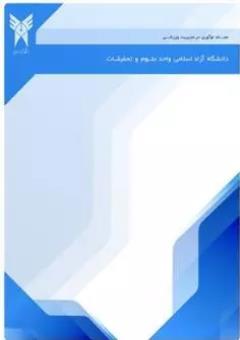The impact of media literacy on the development of sports tourism in the country's desert (Study case: desert of Maqsoodlou region in Heris city)
Subject Areas : Innovation in Sports Management
Sara Seraj
1
*
![]() ,
zahra najafi
2
,
zahra najafi
2
1 - Assistant Professor of Sports Management, Payam Noor University, Tehran, Iran
2 - Graduated with a Master's degree in Sport Mangement of Payam Noor University, Tehran, Iran
Keywords: sports tourism, desert, media literacy.,
Abstract :
The purpose of this research was to investigate the impact of media literacy on the development of sports tourism in the desert area (case study: the desert of Maqsoodlou region in Heris city). This research is applied based on its purpose and descriptive-survey based on the nature and method of data collection. The statistical population of the research includes all senior students of sports management majoring in media in Tehran and Tabriz province. which included 160 people and the number of statistical sample was considered to be 113 people based on Morgan's table, and after distributing the questionnaires, 103 questionnaires were completely returned. The research tools included standard philosophical media literacy questionnaires (2013) and sports tourism of Firouzjah (2016). The face and content validity of the questionnaire was checked by 10 sports management professors, and the reliability of the questionnaire was checked by Cronbach's alpha test and its values were 0.85 and 0.79, respectively. For the statistical analysis of the findings, descriptive statistics and inferential statistics were used, which included structural equation modeling to investigate the effect of the independent variable on the dependent variable. The results of structural equation modeling by PLS software showed that media literacy and its 5 components including understanding the content of media messages, awareness of hidden goals, conscious selection, critical look and analysis of media messages have a positive and significant effect on the development of sports tourism in It has a desert sector. Due to the influence of the media on the lives of all people, planning to increase media literacy is essential nowadays, and by improving the media literacy of sports managers and people, we can witness the growth and prosperity of sports tourism, especially the lesser-known areas in the country such as the field of sports tourism in the desert.
Hashemi, S, M. Alipour, A. Yousefi Fashki, M. Mousavi, M,Najaf. (2019). Identification and prioritization of tourism capabilities in desert areas of Qom province. Geography Research, 52(1), 17-37. (persian).
Johara, F., Abdul Kader Jilani, M. M., & Uddin, M. A. (2022). How Do Social Media Literacy, Psychological Capital and Work Engagement Influence the Employee Morale of the Hospitality and Tourism Industry?. In Technology Application in Tourism Fairs, Festivals and Events in Asia (pp. 79-96). Singapore: Springer Singapore
Matani, M. (2017). Investigating and analyzing the place of media literacy in tourism management and planning (case study of Mazandaran province). Scientific and Research Quarterly of New Approaches in Human Geography, 11(1), 217-242. (persian).
Mohammadi Turkmani, E. Mohammadi Turkmani, H. Gabrieli, A. (2022). Human-ecological feasibility of sports ecotourism development in desert areas (case study: Qom province). Sports marketing studies. 2(1), 100-130. (persian).
Nazarvisi, H. Yektayar, M. Ghasemi, H. (2023). Fitting the model of media literacy in sports with the structural equation modeling approach. Journal of Sports Management, 14(2), 62-43. (persian).
Pantic, N, Milojevic, I. (2019). “Investments and employment in tourism in the Republic of Serbia”. Hotel and Tourism Management, 1(7): 95-104.
Pevneva, M. V. & Maximets, S. V. Toupchi. N. V. (2019). Media as a Means of Developing a Sports Culture of Adolescents. Media education, 59 (3), 425-432
Putri, K. Y. S., Sutjipto, V. W., Anindhita, W., Romli, N. A., Andriani, Y., & Deianeira, D. R. (2022). Digital Literacy Hoax Information in Indonesian Tourism Area. Journal of Digital Marketing and Communication, 2(1), 1-11
Shahbazi, R. Jalali Farahani, M. Khabiri, M. (2019). “Survey and ranking of the role of mass media in the development of sports tourism in Tabriz”. Journal of Communication Management in Sports Media. Seventh Year, 7 (1): 77-84. (persian).
Solberg. H., Preuss.H. (2007). “Major sport events and long-term tourism impacts”. Journal of sport Management, 21 (4): 231- 234.
Soliman, M. R., Baher, M., & Soliman, D. M. (2022). Digital Literacy and its Effect on Employees’ Innovation in Egyptian Official Tourism Organizations
Wanyonyi, Lilian, N., Njoroge, Joseph M.; Otieno, Richard, J. (2021). “Challenges and Opportunities to Sustainable Sport Tourism Events: Insights from an Urban Host City”. Journal of Tourism, Hospitality and Sports, 5 (2), 39 -55.
Zakai, S. Tojari, Farshad. Amirtash, A. M. (2022). The communication model of social networks, media literacy, social capital and social identity of those involved in the sports programs of the Islamic Republic of Iran. Physiology and management research in sports, 13(1), 147-160. (persian).
Zand, A. Faraji, Gh. Mullah Esmaili, M. (2023). Presenting a model of the role of mass media on the sports culture of women athletes of the Iran Futsal League, Journal of Management and Organizational Behavior in Sports, Year 11, Number 7, 17-24. (persian).

